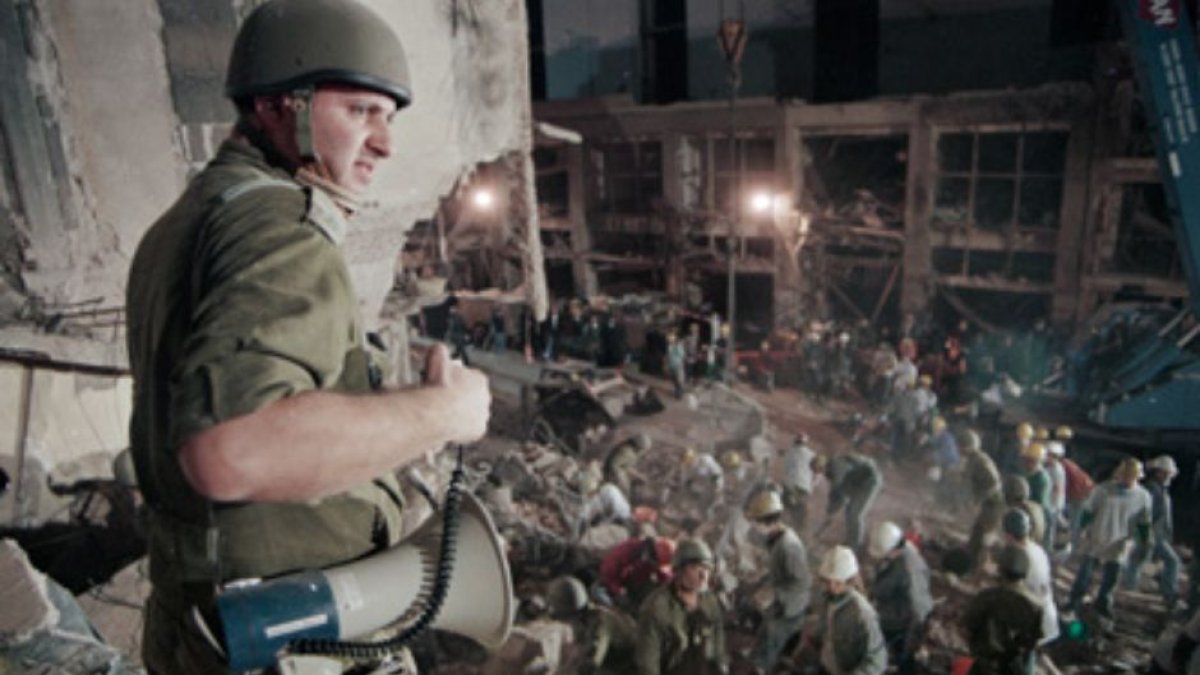Argentina: in a historic ruling, the Judiciary attributes the worst attack in its history to Iran and declared it a "terrorist state"
On July 18, 1994, a bomb exploded inside the Asociación Mutual Israelita Argentina (AMIA), leaving 85 dead and some 300 wounded.

Wikimedia Commons
The Argentine judiciary issued a ruling that could have international repercussions. Judges Carlos Mahiques, Angela Ledesma and Diego Barroetaveña held Iran responsible for the 1994 AMIA bombing and declared the country a "terrorist state." The final sentence of more than 900 pages clearly speaks of a crime against humanity, which could be punished anywhere in the world without time limits.
The judges dug into official documents, evidence and testimonies to clarify once and for all who were the culprits responsible for the worst terrorist attack in the history of Argentina, which took place on July 18, 1994, at 633 Pasteur Street. On that day, 85 people were killed and 300 others were injured by a bomb that exploded inside the Asociación Mutual Israelita Argentina (AMIA).
According to Judge Mahiques, who led the ruling, both the attack against the Israeli embassy in 1992 and the aforementioned episode at the AMIA responded to a political and strategic decision of the Islamic Republic of Iran and were executed by the terrorist organization Hezbollah, "which acted under the inspiration, organization, planning and financing of state and parastatal agencies subordinated to the ayatollahs' government."
Crime against humanity and universal jurisdiction
The three judges agreed that the incident should be qualified as a crime against humanity, which occurs "when terrorism is organized, financed, planned or supported by a state, and its actions transcend the borders of the responsible country, it assumes international responsibility, even when the act has been committed by a group not formally state (Hezbollah), but which acts under the control or direction of the state."
This type of crime also implies the possibility of "universal jurisdiction," according to which any State may prosecute and criminally convict the perpetrators of the act.
The ruling also mentions the "right to the truth" of the victims and their families, as well as the possibility for them to sue those responsible, physical or ideal persons who had a relationship with the attack, "including the Islamic State of Iran."
Mahiques also suggests that these claims could be pursued through diplomatic channels, an arbitral tribunal, or the International Court of Justice.
Prosecutor Alberto Nisman, who was murdered in 2015 just before being able to bring his case before Congress, had denounced former President Cristina Kirchner for "negotiating and organizing the impunity of the Iranian fugitives in the AMIA case, with the purpose of fabricating Iran's innocence."
According to the prosecutor, the then-president had negotiated the lifting of the charges against Iran to buy cheap oil from them. The negotiations to materialize the agreement would have taken place in secret in order to finalize the memorandum of understanding, signed in 2013.
Iranian revenge
The judges wrote a chapter to clarify the reasons for the attacks. Mahiques, Ledesma and Barroetaveña wrote that, among other causes, it was revenge by Iran against the Argentine government, then led by President Carlos Saul Menem.
The then-president unilaterally decided to cancel three contracts for the supply of nuclear material and technology, which had been previously agreed upon with Tehran, which the Iranians considered "intolerable." Therefore, their response was the subsequent planning and execution of the terrorist attacks" as an extreme form of pressure for our country to reverse by force of coercion its decision to cancel those agreements."
Javier Milei's reaction: "The era of impunity in Argentina is over"
In the middle of his trip to the United States, where he is scheduled to meet with Elon Musk, President Javier Milei celebrated the judges' ruling.
In a statement he commented that the ruling "put an end to decades of postponement and cover-up in the AMIA case, determining that the attacks against the Israeli Embassy and the AMIA were perpetrated by Hezbollah, under the auspices of state organizations of the Islamic Republic of Iran."
At the same time, he criticized the pact with Iran signed by Kirchner, accusing her government of "betrayal of the homeland" and alleging that the agreement "promoted and guaranteed terrorist impunity."
"The Federal Chamber of Criminal Cassation has been able to exercise its function with total freedom, without political pressure, to impart the justice that both the victims and their families have been waiting for decades (...) On December 10, 2023, the era of impunity in the Argentine Republic came to an end," he declared.

























